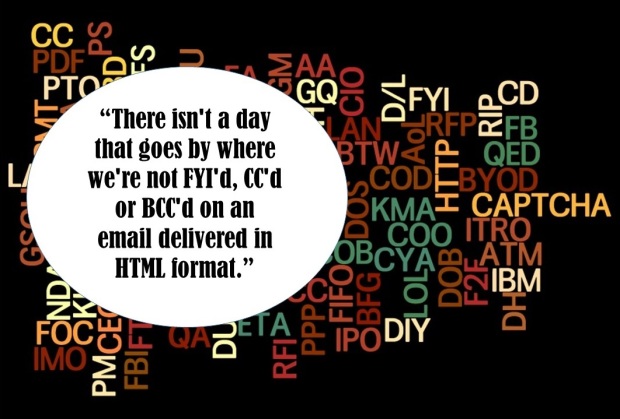Much has been spoken and written about the new language (driven by social media interaction on Twitter, Facebook, WhatsApp etc.) being introduced into our lexicon by millennials or Gen-Y and their ability to integrate and influence the current working culture by using it. Personally I think they’ll find that it’s not much different to that which they already use, in fact I think they’ll find that their ‘elders’ shorten words and phrases much more than they do. Just because we use it in a business context rather than personal doesn’t make it any more or less acceptable.
It wasn’t always that way.
Liverpool (UK) people – and I’m one – are renowned for shortening words and names. James was Jimmy; off licence (liquor store) was the ‘offy’; the Cavern was the ‘Cav’; and Christmas was ‘Chrimbo’. This is seen as an endearing feature of our regional dialect and in some ways is expected of scousers wherever we go. The closest I got to an initialism when I was younger was my ‘EFC are Magic’ badge, but that’s only because it was hard to fit Everton Football Club on something that was 5cm in diameter.
However, I’m not sure I was prepared for a whole different language once I started work. Obviously there were words and phrases that I was unfamiliar with, but I quickly got to grips with these as I spent the first 2 or 3 weeks learning my trade. Even in those early days of work, I don’t remember too many collections of words or phrases being shortened. The manager was still the manager, dockets were still dockets, close of play was ‘by the end of the day’ and it was all very easy to understand. And then around in late 80s the CD arrived, them some eejit changed personnel to HR, IBM became massive and the working language changed forever (RIP) as we sought to give mundane tasks, projects and job titles ‘flashy’ initialisms or acronyms.
Before I continue, here are a couple of definitions in order to avoid any confusion:
Acronym – an abbreviation formed from the initial letters of other words and pronounced as a word
Initialism – an abbreviation consisting of initial letters pronounced separately
For some reason I don’t have too many issues with acronyms as they don’t feel lazy. NATO, NASA, SIM, SARS and er, ABBA are just some examples. Even though they’re abbreviations, they have the good sense to form themselves into words so as to still sound normal and to make my life easier. Also, I generally know what they mean as it makes sense to pronounce them as a word, especially ABBA.
Initialisms on the other hand tend to confuse me (other than S.O.S) and millions of others worldwide and yet we’re doing sweet FA to banish them from our working culture. They’re growing like weeds in camel dung. Even worse, most organisations now have an acronym dictionary (despite most of them not being acronyms) as part of their induction!
THEM: “Welcome to the company Colin, we’re specifically set up to alienate new starters by using a language akin to Klingon, but worse because this is real, whilst Klingon isn’t*. If you last more than 5 years you’ll have a fighting chance of finally understanding what we’re talking about, although we’ll have introduced some more whilst you’re learning these, so it’s unlikely. No matter, go ahead and read this 4 page PDF acronym dictionary or AD as we like to call it.”
ME: “Right, thanks. Do you have a similar document that articulates your vision and describes in detail the behaviours you expect from me in order that we can share in the organisation’s success?'”
THEM: “No.”
ME: “OMG”
Initialisms are never more rife than within projects. How many of you have a project in your organisation whose name has been shortened to its initials e.g. the BFG project? I rest my case. The bigger projects will be sponsored by the COO with QA from the CFO and CIO, but will ultimately be managed by a strong PM (whose delivery instincts are part of their DNA) with support from the PMO and oversight from HR. There’ll be a PID (with an FAQ section) on the back of a BC and If the project requires any kind of procurement activity, expect an RFI or RFQ, followed by an RFP which will need to be QA’d by those people on the panel. If it’s an IT project there’ll be a weekly PSR and then testing – SIT, BIT and UAT before we decide that all is well and we implement it by writing an EPR to put it into BAU (but only once the PSC has approved it).
There isn’t a day that goes by where we’re not FYI’d, CC’d or BCC’d on an email delivered in HTML format. Oh and BTW, sometimes they require our response ASAP or at the latest by COP today. If you’re a CEO (who likely paid COD for their BMW) you can just get your EA or PA to do it, or else just ask a GM.
*No doubt there is a Klingon language and someone has probably put together a dictionary, I just didn’t want to Google it and have my wife discover it in my internet history.

Love this. Love the humour too 🙂
LikeLike
Thanks Janine!
LikeLike
Reblogged this on hrtechgirl.
LikeLike
Colin, I hope you don’t mind but I have reblogged you?
LikeLiked by 1 person